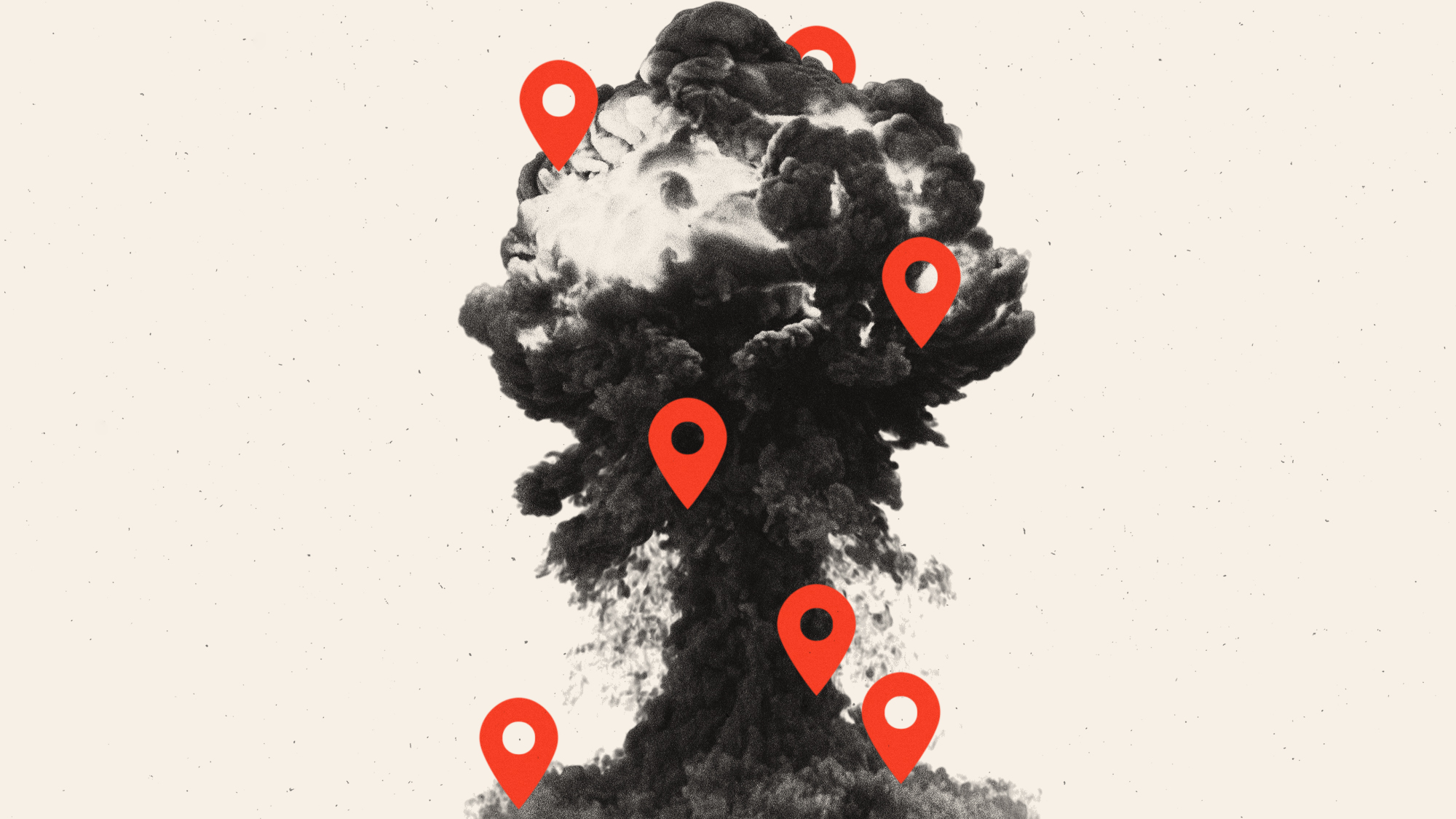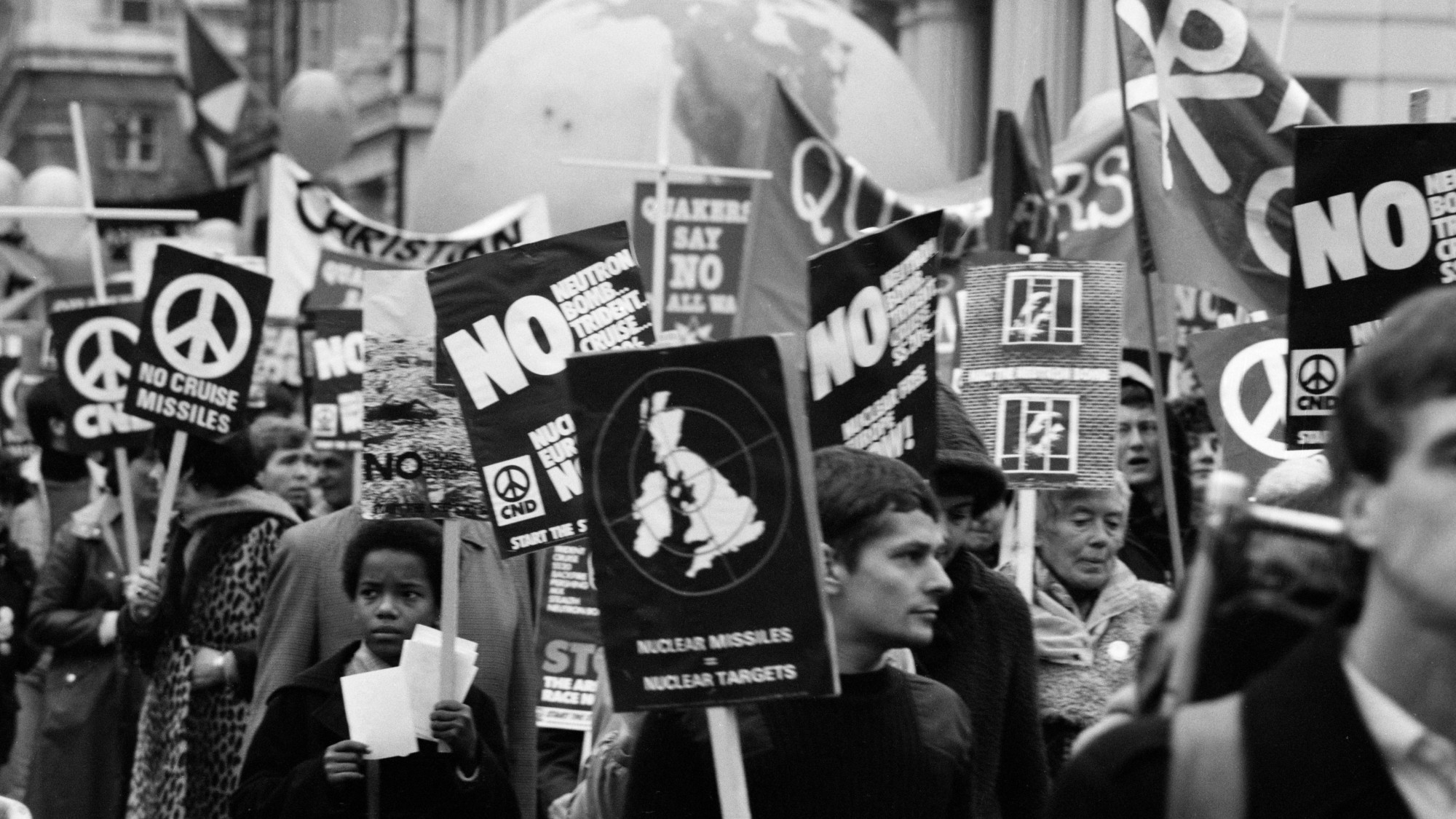Where is the safest place in a nuclear attack?
From safest countries to the most secure parts of buildings, these are the spots that offer the most protection

A free daily email with the biggest news stories of the day – and the best features from TheWeek.com
You are now subscribed
Your newsletter sign-up was successful
The UK is investing in nuclear-capable fighter jets amid "rising nuclear risks", Defence Secretary John Healey has said. Speaking at the Nato summit in The Hague this week, Healey confirmed that the government would purchase 12 F-35A jets, capable of carrying US-supplied B61 tactical nuclear weapons. The jets will be used for conventional missions but, in "extreme circumstances", they would enable the UK to "participate in the nuclear mission for Nato".
While the government hopes the expansion of its nuclear arsenal will deter attacks, some believe that it will simply "fuel a global nuclear arms race" and "the normalisation of nuclear warfare", said Simon Tisdall in The Guardian. Once that "taboo is broken", the world is on a "fast-track ticket to oblivion".
Amid such rhetoric, and the recent exchange of missiles between Israel, Iran and the US, it's no surprise that interest in nuclear shelters has increased dramatically. Matt Wright, director of bunker firm Burrowed, told the Daily Mail that the company had received ten times as many orders as usual in the past few days. "We've got thousands of enquiries coming in," he said. "It's gone up dramatically and I can only put that down to what's been happening."
The Week
Escape your echo chamber. Get the facts behind the news, plus analysis from multiple perspectives.

Sign up for The Week's Free Newsletters
From our morning news briefing to a weekly Good News Newsletter, get the best of The Week delivered directly to your inbox.
From our morning news briefing to a weekly Good News Newsletter, get the best of The Week delivered directly to your inbox.
If a £100,000 bunker is out of budget, here are some of the safest alternative places to be in the event of a nuclear blast.
Safest places in buildings
A study published in the Physics of Fluids journal examined the safest places to take shelter within a building should a devastating attack occur.
Researchers from the University of Nicosia in Cyprus used advanced computer modelling to investigate what impact a 750-kiloton-rated nuclear blast wave would have on humans inside a building close to the fictional attack. Their results suggested that "even if you're hiding indoors" and relatively far from the explosion, the blast's high-speed winds "could still be enough to kill or seriously injure you", reported the tech and science site Gizmodo.
For that reason, the most dangerous places to hide are likely to be "in the direct vicinity of the windows, door openings and hallways, since this is where the air will be most funnelled through in the shockwave". Following the same logic, the study concluded that the best place to shelter would be "in a sturdy building at the far end of the room from any door or window, and ideally in a corner", said Newsweek.
A free daily email with the biggest news stories of the day – and the best features from TheWeek.com
Safest types of building
Ready.gov, an official website of the US government, advises that people "get inside the nearest building" should nuclear sirens suddenly sound – but not all buildings offer equal protection.
Concrete-reinforced buildings are generally thought to be the safest option as they would "largely remain intact" should a blast occur – however "not necessarily everyone inside them would survive", said Gizmodo.
In "Protect and Survive", a UK public information campaign that ran in the early 1980s, people were advised that, if they lived in a block of flats five storeys high or more, it was best not to shelter on the top two floors. The basement or ground floor will give you the best protection, and central corridors on lower floors will provide good protection.
For city-dwellers, the best places to shelter include underground spaces, reported Newsweek. "One would be much safer" in an "underground purpose-built blast or fallout shelter," Jack L. Rozdilsky, an associate professor of disaster and emergency management at York University in Canada, told the site. But "even locations like basements of buildings or deep sections of subway tunnels would provide better protection than being in buildings above the surface."
In 2022, the Daily Express reported that the safest places in the UK would be those furthest from major cities. The 20 locations recommended included Cornwall, Folkestone, Skegness and Anglesey.
Safest areas of the UK
As you might expect, anyone living in or around London, Birmingham, Manchester, Leeds or Glasgow will have the lowest chance of survival if Britain's major cities are targeted. Being "outside the blast zone" will be "crucial" to a chance of making it through, said the Daily Express.
The impact of a nuclear blast depends on numerous factors, "including radiation, fireball, air blast, and thermal radiation", and the distance dangerous radiation could spread varies with the weather conditions.
Remote places, such as the Shetland Islands, will be the safest if the bomb drops. Other locations like Cornwall, Inverness, and Aberystwyth could also be safe from the effects of the initial blasts, given their distance from major cities.
However, you wouldn't necessarily "be safe if you lived hundreds of miles from where the bomb dropped", said The Spectator. A subsequent nuclear winter would lead to "drastic falls in temperatures and sunshine, a global agricultural collapse and disaster for virtually all forms of life on Earth for decades".
Safest countries
The countries "with the best hope of at least seeing their civilisation survive" during the 10 years after a nuclear war would be Argentina and Australia, said The Times. A 2022 study published in Nature Food suggests that these two countries – and several others across central Africa – would be able to maintain life because "they already grew more resistant crops, such as wheat, in large quantities and also had low populations".
Closer to home, you could consider Iceland. The Smart Survivalist named the Nordic country as the safest place in the event of a nuclear war. "Because Iceland is isolated from the rest of the world by the North Atlantic Ocean, it would be very difficult for a nuclear missile to reach Iceland without being detected first," it said.
Also, it added, Iceland generates all of its electricity from geothermal sources, so even if the entire electrical grid went down, Iceland "would still have power thanks to its natural hot springs".
The site also noted that Canada has a "large landmass and population spread out over a wide area", making it "less likely that a single nuclear strike could wipe out the entire country".
Modelling by The Guardian in 2016 found that, "should atomic annihilation be on the cards", the safest places to live would be Antarctica, because the "sub-zero continent" is "miles from anywhere", or Easter Island in the South Pacific, which is more than 2,000 miles from South America.
In the US, modelling by researchers at the University of Massachusetts Amherst starts with the midwest as a "prime target" as the country's intercontinental ballistic missile launch facilities are based in the region, and "taking them out early would be a strategic advantage for any foreign adversary", said the Daily Mail.
Landlocked states like Nebraska, Kansas, Iowa and Missouri would also be "decimated in the immediate aftermath of the explosion", the researchers said, while coastal states such as Oregon, Washington, Florida and New York "might be able to bide their time for at least four days, before radiation poisoning spread to those areas".
With mounting anxieties around the risk of a nuclear conflict, some countries have begun ramping up preparations in case the worst happens. In Switzerland, the government last year announced plans to modernise the country's extensive system of bomb shelters, due to the "global security situation", the Zurich-based Tages Anzeiger reported. The work is projected to cost 220 million Swiss francs (£198 million).
Chas Newkey-Burden has been part of The Week Digital team for more than a decade and a journalist for 25 years, starting out on the irreverent football weekly 90 Minutes, before moving to lifestyle magazines Loaded and Attitude. He was a columnist for The Big Issue and landed a world exclusive with David Beckham that became the weekly magazine’s bestselling issue. He now writes regularly for The Guardian, The Telegraph, The Independent, Metro, FourFourTwo and the i new site. He is also the author of a number of non-fiction books.
-
 Colbert, CBS spar over FCC and Talarico interview
Colbert, CBS spar over FCC and Talarico interviewSpeed Read The late night host said CBS pulled his interview with Democratic Texas state representative James Talarico over new FCC rules about political interviews
-
 The Week contest: AI bellyaching
The Week contest: AI bellyachingPuzzles and Quizzes
-
 Political cartoons for February 18
Political cartoons for February 18Cartoons Wednesday’s political cartoons include the DOW, human replacement, and more
-
 New START: the final US-Russia nuclear treaty about to expire
New START: the final US-Russia nuclear treaty about to expireThe Explainer The last agreement between Washington and Moscow expires within weeks
-
 What would a UK deployment to Ukraine look like?
What would a UK deployment to Ukraine look like?Today's Big Question Security agreement commits British and French forces in event of ceasefire
-
 The history of US nuclear weapons on UK soil
The history of US nuclear weapons on UK soilThe Explainer Arrangement has led to protests and dangerous mishaps
-
 Trump peace deal: an offer Zelenskyy can’t refuse?
Trump peace deal: an offer Zelenskyy can’t refuse?Today’s Big Question ‘Unpalatable’ US plan may strengthen embattled Ukrainian president at home
-
 Vladimir Putin’s ‘nuclear tsunami’ missile
Vladimir Putin’s ‘nuclear tsunami’ missileThe Explainer Russian president has boasted that there is no way to intercept the new weapon
-
 How should Nato respond to Putin’s incursions?
How should Nato respond to Putin’s incursions?Today’s big question Russia has breached Nato airspace regularly this month, and nations are primed to respond
-
 Russia’s war games and the threat to Nato
Russia’s war games and the threat to NatoIn depth Incursion into Poland and Zapad 2025 exercises seen as a test for Europe
-
 What will bring Vladimir Putin to the negotiating table?
What will bring Vladimir Putin to the negotiating table?Today’s Big Question With diplomatic efforts stalling, the US and EU turn again to sanctions as Russian drone strikes on Poland risk dramatically escalating conflict